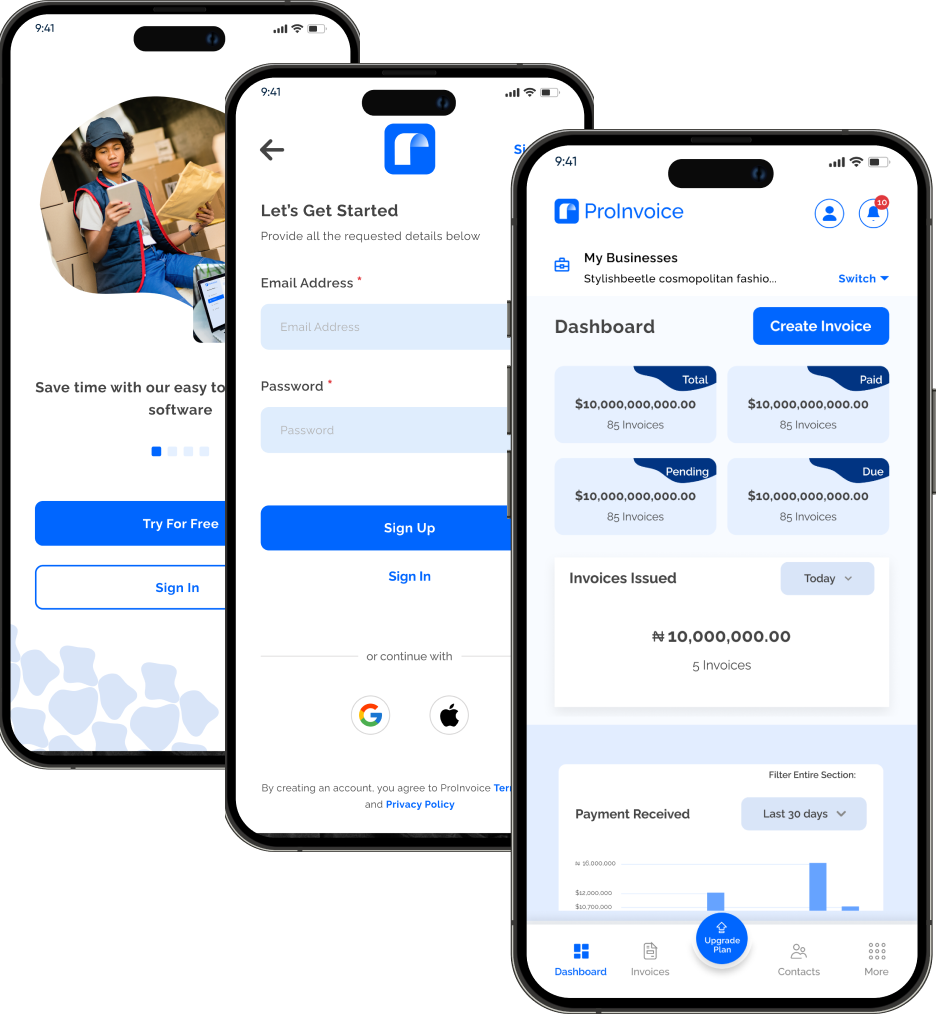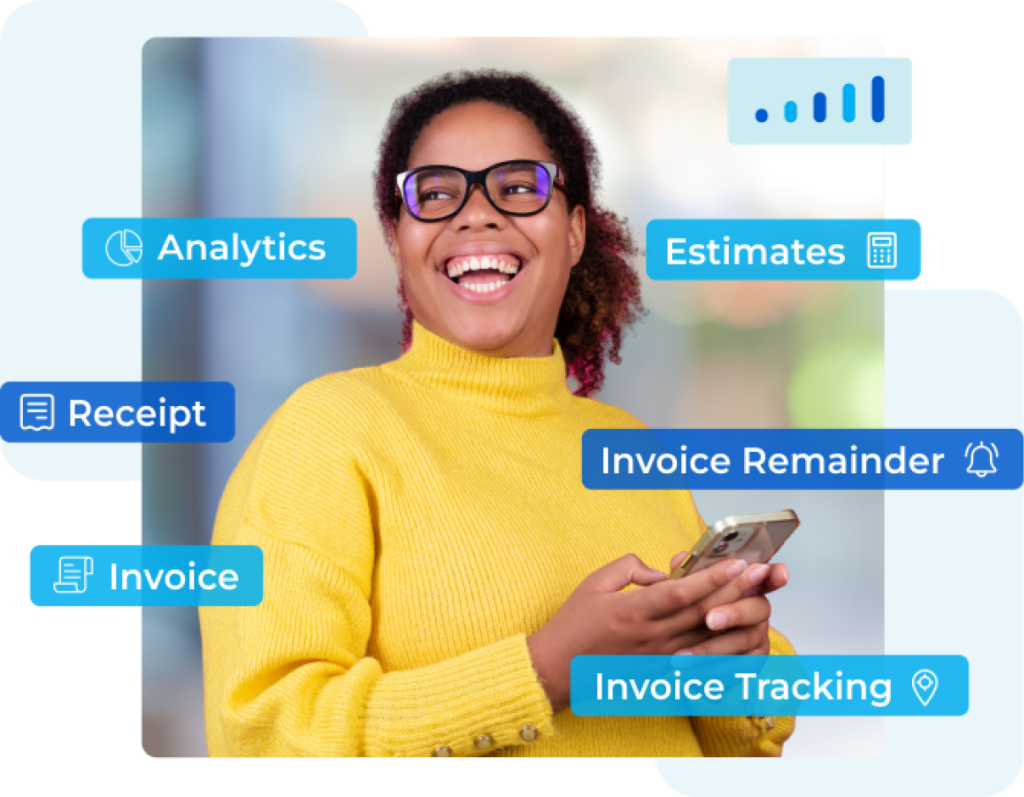In today’s competitive business landscape, effective invoice management has evolved far beyond simple billing processes. Modern businesses are discovering that strategic invoicing systems serve as powerful tools for lead tracking, customer relationship management, and sustainable business growth. With the advent of sophisticated invoice maker platforms like ProInvoice, companies can now transform routine billing into comprehensive growth engines that drive customer acquisition, retention, and revenue optimization.
This comprehensive guide explores how businesses can leverage advanced invoicing software to transform their operations, accelerate growth, and maintain competitive advantages in rapidly evolving markets. From automated lead nurturing to predictive analytics, modern invoicing solutions offer unprecedented opportunities for business optimization and customer relationship enhancement.
1. Understanding the Connection Between Invoicing and Lead Management
The relationship between invoicing and lead tracking represents one of the most underutilized opportunities in modern business operations. Every invoice generated through a professional invoice generator tells a detailed story about customer behavior, purchasing patterns, seasonal trends, and business relationships that can be invaluable for developing future growth strategies and marketing initiatives.
When businesses implement sophisticated online invoicing software, they gain access to rich data insights that extend far beyond payment processing and transaction recording. These systems capture crucial information about customer preferences, buying cycles, payment behaviors, and engagement patterns that can inform lead generation strategies, customer segmentation, and targeted marketing campaigns.
1.1 The Evolution of Invoice-Based Customer Intelligence
Traditional billing software focused primarily on billing accuracy and payment collection. However, modern platforms have evolved into comprehensive business intelligence tools that provide actionable insights into customer behavior and market trends. By analyzing invoice patterns through advanced invoice tracking systems, businesses can identify emerging opportunities, predict customer needs, and develop proactive strategies for customer retention and growth.
The integration of advanced analytics with invoicing processes enables businesses to understand which products or services generate the highest margins, which customers represent the greatest lifetime value, and which marketing channels produce the most qualified leads. This intelligence becomes the foundation for data-driven decision making and strategic business planning.
1.2 Professional Invoice Templates and Brand Consistency
Modern invoice templates play a crucial role in maintaining professional brand image while capturing essential customer data for lead tracking purposes. Well-designed invoice templates ensure consistency across all customer communications, reinforce brand identity, and create positive impressions that encourage repeat business and referrals.
Customizable invoice templates enable businesses to incorporate branding elements, personalized messaging, and strategic calls-to-action that support lead generation objectives. These templates serve as powerful marketing tools that extend brand reach and influence customer perception while facilitating essential business processes.
2. The Strategic Importance of Invoice-Based Lead Tracking
2.1 Customer Lifecycle Management and Revenue Optimization
Professional invoicing systems provide comprehensive visibility into the entire customer lifecycle, from initial engagement through long-term relationship development. Companies utilizing free invoice solutions can track customer engagement patterns, identify opportunities for upselling and cross-selling, and develop targeted retention strategies that maximize customer lifetime value.
Modern invoice templates enable businesses to maintain brand consistency while capturing essential customer data. The data generated through consistent invoicing practices helps businesses understand customer purchasing frequencies, seasonal preferences, and price sensitivity levels. This information becomes crucial for developing personalized marketing campaigns, optimizing pricing strategies, and timing promotional offers for maximum impact.
2.2 Advanced Revenue Pattern Analysis with Invoice Apps
Effective invoice app tracking reveals complex seasonal trends, payment behaviors, and revenue fluctuations that inform strategic business decisions. Companies can identify peak sales periods, understand cash flow patterns, and make data-driven decisions about inventory management, staffing levels, marketing investments, and expansion opportunities.
By analyzing invoice data across multiple time periods using professional invoicing tools, businesses can develop predictive models that forecast future revenue, anticipate customer needs, and identify potential challenges before they impact operations. This proactive approach to business management significantly improves planning accuracy and operational efficiency.
2.3 Customer Segmentation and Targeting Strategies
Invoice data provides valuable insights for customer segmentation strategies. Businesses can categorize customers based on purchase history, payment patterns, order frequency, and transaction values using sophisticated invoice management systems. This segmentation enables targeted marketing campaigns, personalized pricing strategies, and customized service offerings that resonate with specific customer groups.

Advanced segmentation based on invoice data helps businesses identify high-value customer segments, understand their unique needs and preferences, and develop specialized offerings that drive increased engagement and revenue. This targeted approach significantly improves marketing ROI and customer satisfaction levels while supporting comprehensive lead tracking initiatives.
3. Leveraging Technology for Enhanced Lead Tracking
3.1 Comprehensive Mobile Application Integration
Modern businesses require flexible solutions that work seamlessly across all platforms and devices. Leading mobile invoicing platforms now offer comprehensive mobile applications available for download on both Apple App Store and the Google Play Store, enabling businesses to manage invoicing, lead tracking, and customer relationships from anywhere at any time. Mobile invoicing applications provide real-time access to customer data, payment status updates, business analytics, and performance metrics. Sales teams can generate professional quotes using customizable invoice templates, track proposal status, monitor customer interactions, and convert leads into paying customers directly from their mobile devices, significantly reducing sales cycles and improving conversion rates.

The ability to create invoice for free while mobile enhances business agility and responsiveness. Sales representatives can respond to customer inquiries immediately, generate quotes on-site using professional invoice templates, and maintain momentum in the sales process without delays caused by office-based systems or complex approval processes.
3.2 Cloud-Based Data Analytics and Business Intelligence
Cloud-based invoice software systems aggregate customer data across multiple touchpoints, channels, and time periods, providing businesses with comprehensive insights into lead behavior, conversion patterns, and revenue trends. These platforms can identify which marketing channels generate the highest-value customers, which products have the best profit margins, and which customer segments offer the greatest growth potential.
The integration of artificial intelligence and machine learning capabilities into cloud-based invoicing systems enables predictive analytics that can forecast customer behavior, identify upselling opportunities, and recommend optimal pricing strategies. This advanced functionality transforms reactive billing processes into proactive business development tools that support comprehensive lead tracking and customer relationship management.
3.3 Advanced Dashboard Analysis and Reporting
Modern invoicing platforms feature sophisticated dashboard analysis capabilities that provide real-time visibility into business performance, customer trends, and revenue patterns. These dashboards consolidate complex data into intuitive visualizations that enable quick decision-making and strategic planning while supporting comprehensive lead tracking initiatives.
Interactive dashboards allow businesses to drill down into specific metrics, compare performance across different time periods, and identify trends that might not be apparent in traditional reporting formats. Professional accounting software with integrated dashboard capabilities transforms raw invoice data into actionable business intelligence that drives growth and optimization.
4. Best Practices for Invoice-Driven Business Growth
4.1 Automated Follow-Up Systems and Customer Engagement
Implementing automated follow-up systems within invoicing workflows helps businesses maintain consistent communication with leads and customers while reducing manual administrative tasks. Automated reminders, thank-you messages, promotional offers, and customer satisfaction surveys can be triggered based on invoice status, payment history, and customer behavior patterns.
Advanced invoice automation systems ensure that no opportunity falls through the cracks while maintaining professional relationships with existing customers. Businesses can set up sophisticated sequences that nurture leads through the sales funnel, provide value-added content, and encourage repeat purchases without requiring constant manual intervention.
4.2 Personalized Customer Experiences and Communication
Advanced invoice creator systems enable businesses to create highly personalized experiences based on comprehensive customer history and preferences. Custom invoice templates, personalized messaging, tailored product recommendations, and individualized payment terms can significantly improve customer satisfaction and encourage repeat business.
Personalization extends beyond aesthetic customization to include communication preferences, delivery options, and service levels. When customers feel understood and valued through personalized interactions facilitated by professional billing apps and customized invoice templates, they are more likely to become long-term advocates for the business and provide valuable referrals.
4.3 Multi-Channel Communication and SMS Integration
Modern invoicing platforms support multi-channel communication strategies that meet customers where they prefer to engage. The ability to send invoice by SMS provides immediate delivery and high open rates, ensuring that important billing information reaches customers quickly and efficiently.
SMS integration through advanced digital invoicing platforms enables businesses to send payment reminders, delivery notifications, and promotional offers directly to customer mobile devices. This immediate communication channel significantly improves customer engagement and reduces payment delays while providing additional touchpoints for relationship building and lead nurturing.
4.4 Integration with CRM Systems and Sales Platforms
Seamless integration between electronic invoicing systems and customer relationship management (CRM) platforms creates a unified view of customer interactions across all touchpoints. This integration ensures that sales teams have access to complete customer histories, including purchase patterns, payment behaviors, communication preferences, and service interactions.
The combination of invoicing data and CRM information enables businesses to identify high-value prospects, predict customer needs, develop targeted retention strategies, and optimize sales processes. Sales teams can prioritize leads based on comprehensive historical data and focus their efforts on the most promising opportunities while utilizing professional invoice templates for consistent communication.
5. Advanced Features and Capabilities
5.1 Automated Invoice Generation and Workflow Management
Modern invoice builders offer sophisticated automation capabilities that streamline billing processes while maintaining accuracy and consistency. Automated invoice generation based on predefined triggers, recurring billing for subscription services, and workflow management for approval processes significantly reduce administrative overhead and improve operational efficiency.
These automation features enable businesses to scale their operations without proportionally increasing administrative costs. By automating routine tasks through professional invoice systems, companies can redirect resources toward strategic initiatives, customer relationship building, and business development activities that drive growth and support comprehensive lead tracking efforts.
5.2 Real-Time Payment Processing and Cash Flow Management
Advanced online billing systems integrate with multiple payment processors and financial institutions to provide real-time payment processing and cash flow visibility. This integration enables businesses to track payment status, manage accounts receivable, and optimize cash flow management strategies while maintaining professional communication through customized invoice templates.
Real-time payment processing also improves customer experience by providing immediate payment confirmation and reducing friction in the purchase process. Customers appreciate the convenience and security of modern payment options, which can positively impact their overall satisfaction and likelihood to recommend the business.
5.3 Comprehensive Reporting and Analytics
Sophisticated reporting capabilities through advanced invoice solutions provide businesses with detailed insights into financial performance, customer behavior, and operational efficiency. Customizable reports can be generated for specific time periods, customer segments, product categories, or business units, enabling targeted analysis and strategic planning.
Advanced analytics features can identify trends, correlations, and patterns that might not be apparent through traditional reporting methods. This analytical capability enables businesses to make data-driven decisions that optimize performance and drive sustainable growth while supporting comprehensive lead tracking and customer relationship management initiatives.
6. Mobile App Benefits and Download Information
6.1 Enhanced Mobility and Accessibility
The ProInvoice mobile app available for download on Apple App Store and Google Play Store provides unprecedented flexibility for businesses managing invoicing and customer relationships on the go. This mobile accessibility ensures that critical business processes never halt due to location constraints or device limitations.
Mobile applications enable real-time collaboration between team members, instant customer communication, and immediate access to business analytics. The ability to create invoices online from any location using professional invoice templates significantly improves business responsiveness and customer service quality.
6.2 Offline Functionality and Data Synchronization
Advanced mobile invoicing applications offer offline functionality that ensures business continuity even in areas with limited internet connectivity. Data synchronization capabilities automatically update information once connectivity is restored, maintaining data integrity and preventing information loss while preserving access to invoice templates and customer data.
This offline capability is particularly valuable for businesses with field sales teams, service technicians, or international operations where reliable internet access may not always be available. The ability to continue generating professional invoices using customized invoice templates ensures uninterrupted business operations.
7. Measuring Success and ROI
7.1 Key Performance Indicators and Metrics
Successful invoice-based lead tracking requires monitoring specific key performance indicators (KPIs) that align with business objectives and growth targets. Important metrics include customer acquisition cost, lifetime customer value, invoice-to-payment cycle time, repeat purchase rates, and customer satisfaction scores measured through comprehensive invoice reporting systems.
Regular analysis of these metrics helps businesses identify trends, optimize processes, and make informed decisions about resource allocation and strategic priorities. Companies can track the effectiveness of different lead generation strategies and adjust their approaches based on data-driven insights and performance outcomes while utilizing professional invoice templates for consistent customer communication.
7.2 Continuous Improvement Strategies and Optimization
The most successful businesses treat their professional invoicing and lead tracking systems as evolving tools that require regular optimization and enhancement. Regular review of processes, customer feedback analysis, system updates, and performance evaluations ensure that businesses continue to maximize the value of their invoicing investments.
Continuous improvement involves staying current with technology advances, industry best practices, and evolving customer expectations. Businesses should regularly evaluate their invoicing processes, invoice templates, and look for opportunities to enhance efficiency, improve customer experience, and drive growth through innovation and optimization.
7.3 Return on Investment Analysis
Calculating the return on investment (ROI) for business invoicing systems requires considering both direct cost savings and indirect benefits such as improved customer retention, increased sales efficiency, and enhanced business intelligence capabilities. Comprehensive ROI analysis should include factors such as reduced administrative costs, improved cash flow, increased customer lifetime value, and enhanced competitive positioning.
The long-term benefits of sophisticated invoicing systems often exceed the initial investment costs, particularly when considering the cumulative impact of improved customer relationships, operational efficiency, and strategic decision-making capabilities supported by professional invoice templates and comprehensive analytics.
8. Future Trends in Invoicing and Lead Management
8.1 Artificial Intelligence and Machine Learning Integration
The integration of artificial intelligence (AI) and machine learning into smart invoicing systems is revolutionizing how businesses approach lead tracking, customer management, and revenue optimization. AI-powered systems can predict customer behavior, identify upselling opportunities, automate complex decision-making processes, and provide personalized recommendations while optimizing invoice templates for maximum effectiveness.
Machine learning algorithms analyze historical invoicing data to identify patterns and correlations that human analysts might miss. These insights can inform marketing strategies, pricing decisions, customer retention efforts, and product development initiatives, providing businesses with significant competitive advantages while supporting comprehensive lead tracking and customer relationship management.
8.2 Blockchain Technology and Security Enhancements
Emerging technologies like blockchain are enhancing the security, transparency, and reliability of secure invoicing systems. These advances build customer trust, ensure data integrity, and provide audit trails that support compliance requirements and regulatory standards while maintaining the professional appearance of customized invoice templates.
Enhanced security features enable businesses to collect and analyze more detailed customer information while maintaining compliance with privacy regulations such as GDPR and CCPA. This security foundation supports more sophisticated lead tracking and analysis capabilities without compromising customer trust or regulatory compliance.
8.3 Internet of Things (IoT) Integration
The integration of Internet of Things (IoT) devices with automated invoicing systems creates new opportunities for automated billing, usage-based pricing, and real-time customer insights. IoT sensors can trigger automatic invoice generation using professional invoice templates based on product usage, service consumption, or performance metrics.
This integration enables businesses to offer innovative pricing models, improve customer transparency, and develop new revenue streams based on actual usage patterns and value delivered to customers while maintaining professional communication through customized invoice templates.
9. Implementation Strategies and Best Practices
9.1 System Selection and Evaluation Criteria
Choosing the right invoice platform requires careful evaluation of business needs, technical requirements, integration capabilities, and growth projections. Key evaluation criteria should include scalability, customization options, reporting capabilities, mobile accessibility, availability of professional invoice templates, and integration with existing business systems.
Businesses should also consider the total cost of ownership, including implementation costs, training requirements, ongoing maintenance, and upgrade expenses. A comprehensive evaluation process ensures that the selected system will support both current needs and future growth objectives while providing access to professional invoice templates that maintain brand consistency.
9.2 Change Management and User Adoption
Successful implementation of new invoice management platforms requires effective change management strategies that address user concerns, provide comprehensive training, and ensure smooth transitions from existing processes. User adoption is critical for realizing the full benefits of advanced invoicing capabilities and professional invoice templates.
Change management strategies should include stakeholder engagement, communication plans, training programs, and ongoing support to ensure that users understand the benefits and can effectively utilize the new system capabilities, including customization of invoice templates and advanced analytics features.
9.3 Data Migration and System Integration
Migrating data from existing systems and integrating new cloud invoicing platforms with current business processes requires careful planning and execution. Data integrity, system compatibility, and workflow continuity are critical considerations during the implementation process, including the preservation of existing invoice templates and customer communication preferences.
Professional implementation services can help ensure successful data migration and process optimization while minimizing disruption to ongoing business operations and maintaining access to customized invoice templates that support brand consistency.
10. Conclusion
The role of invoicing in lead tracking and business growth represents a significant opportunity for forward-thinking businesses seeking competitive advantages. By implementing comprehensive invoice management solutions that integrate mobile applications, CRM platforms, analytics tools, and automation capabilities, companies can transform routine billing processes into powerful growth engines that drive customer acquisition, retention, and revenue optimization.
Success requires a strategic approach that views invoicing as more than just payment processing and transaction recording. Businesses that leverage invoicing data for lead tracking, customer analysis, predictive analytics, and growth planning will find themselves better positioned to compete effectively, respond to market changes, and capitalize on emerging opportunities while maintaining professional communication through customized invoice templates.
The investment in professional business billing software pays significant dividends through improved customer relationships, enhanced data insights, operational efficiency, and accelerated business growth. As technology continues to evolve and customer expectations become more sophisticated, businesses that embrace these advanced tools and capabilities will be best positioned to achieve sustainable success and maintain competitive advantages.
Modern invoicing platforms offer unprecedented opportunities for business optimization, customer engagement, and revenue growth. By leveraging these capabilities effectively through comprehensive solutions available on mobile platforms, businesses can transform their operations, enhance customer experiences through professional invoice templates, and build sustainable competitive advantages that drive long-term success in increasingly competitive markets.
Download the ProInvoice mobile app today from the Apple App Store or Google Play Store to start transforming your invoicing processes into powerful business growth tools with access to professional invoice templates and comprehensive analytics capabilities.













